Japan’s Shinzo Abe Fatally Shot in the Heart With Homemade Gun
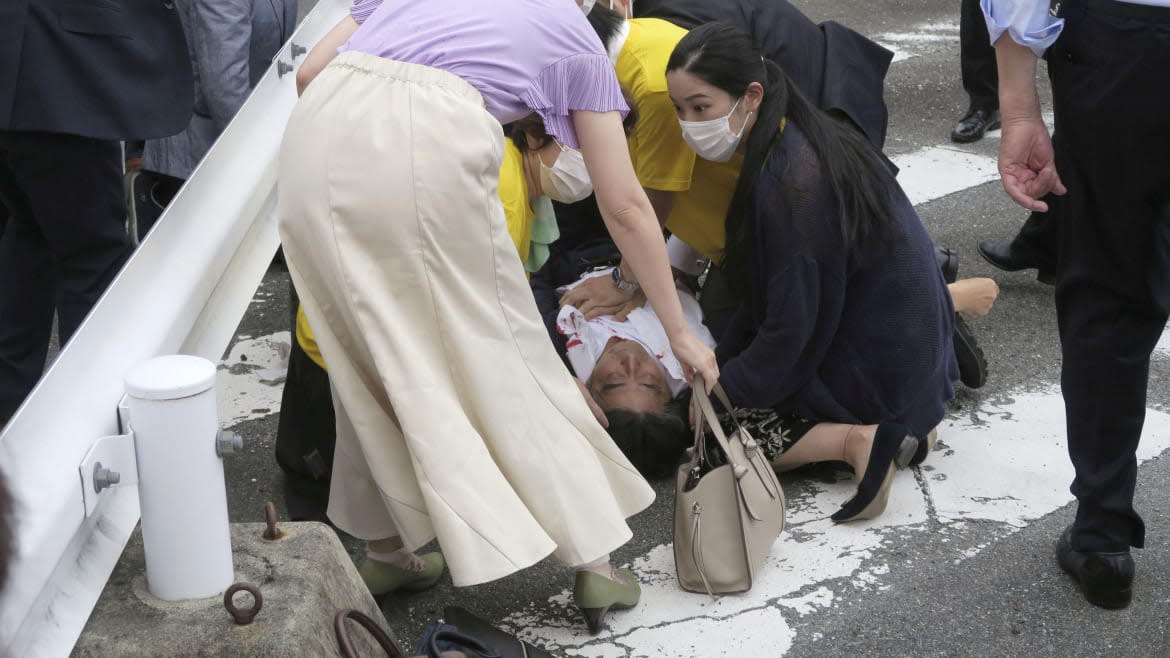
- Oops!Something went wrong.Please try again later.
HOKKAIDO, Japan—Former Japanese Prime Minister Shinzo Abe was shot at close range in a brazen assassination on Friday.
Police immediately arrested a suspect at the campaign rally with what looked like a bizarre homemade firearm. The alleged attacker, named by police as Tetsuya Yamagami, 41, previously served in the Japanese navy, according to a local report.
Abe, 67, was conscious as he was rushed away from the scene, but his condition deteriorated rapidly and within hours, the state broadcaster announced that he had died. A parliamentarian in the Komeito party, which is allied to Abe’s party, confirmed to The Daily Beast that the former prime minister “cannot be resuscitated.”
The hospital said Abe had suffered wounds to the neck and heart, and received over 100 units of blood in transfusions over four hours but they could not revive him.
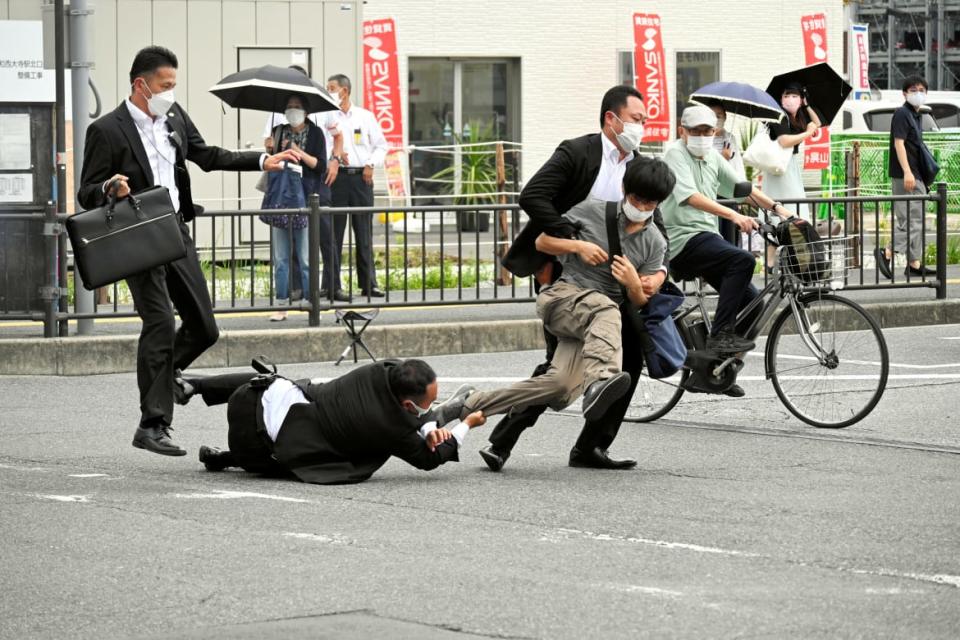
The suspect in the assassination of former Japanese Prime Minister Shinzo Abe is tackled by police officersin Nara.
The nation of Japan was in shock as the news of Abe’s death was reported in the early evening Japan time. Many had been hoping that he might miraculously pull through.
Abe was Japan’s longest-serving prime minister and tremendously popular in his representative prefecture of Yamaguchi. He was unable to achieve of his goal of changing Japan’s constitution to allow the country to become a military power—the dream of his grandfather Kishi—but his much vaunted Abenomics (economic policy) did restore Japan to the world stage. His close friendship with Donald Trump also earned him supporters among American rightwingers.
While the country was in total shock at the outbreak of political violence, it would be an exaggeration to say there was a mood of national mourning. Abe was mired in scandal by the time he left office two years ago, only 36 percent of the public supported him. Even after returning to the political sphere after a few months of laying low, while prosecutors investigated him for violations of the election law, he remained a very divisive figure in Japan.
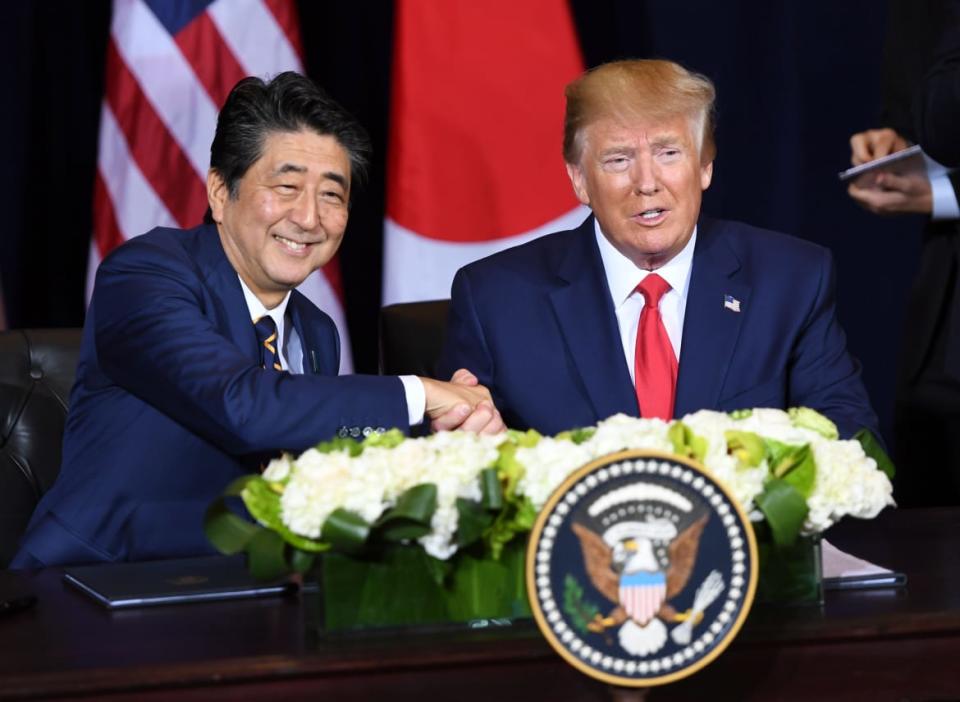
The titan of Japanese politics was shot in the city of Nara at around 11:30 a.m. local time (10:30 p.m. ET) by a man who came at him from behind with what looked like some kind of improvised firearm.
An NHK reporter on the scene reported hearing at least two gunshots, and seeing blood as Abe collapsed to the ground after the second shot.
Footage on Japanese television showed paramedics working on Abe, whith white smoke billowing around them, immediately after the attack. An aerial shot then showed medics moving the former prime minister from an ambulance to a helicopter under a giant blue tarp.
Abe—who served two terms as prime minister from 2006 to 2007 and 2012 to 2020—was taken to Nara Medical University Hospital, according to the Nara Fire Department.
Tokyo Governor Yuriko Koike fought back tears as she addressed the media. “I am incredibly shocked,” she said. “No matter the reason, such a heinous act is absolutely unforgivable. It is an affront against democracy.”
All Cabinet members out campaigning ahead of Sunday’s Upper House elections have been asked to return to Tokyo. Prime Minister Fumio Kishida canceled his afternoon campaign events and was making his way back to the capital from Yamagata.
The reaction of the police, who have been accused of lax security, was to strengthen election security across Japan. Meanwhile, the Nara police raided the homes of the suspect, Yamagami, and his family.
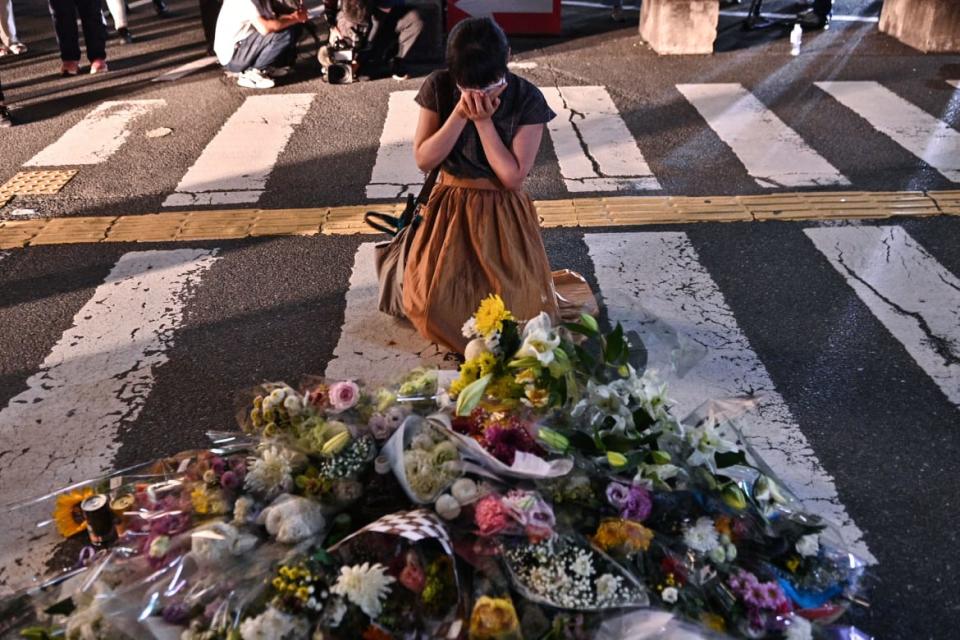
A woman reacts in front of a makeshift memorial where people place flowers at the scene outside Yamato-Saidaiji Station in Nara where former Japanese prime minister Shinzo Abe was shot earlier in the day.
The man, who was dressed in a gray shirt and khaki-colored pants during the attack, was tackled to the ground after the incident. He was “just standing there,” according to a witness. Police confiscated the firearm that he had allegedly been carrying.
Local media captured footage of the suspect waiting calmly for Abe’s speech to begin before the attack. He has been arrested on charges of attempted murder.
For three years, Yamagami served in Japan’s navy, which has been known as the Maritime Self-Defense Force since the country disbanded its armed forces after World War II.
The weapon used by the assassin does not appear to be a standard commercially manufactured rifle.
“The box-like device is wrapped in black tape and smoke can be seen coming from the muzzle. It’s certainly no standard shotgun,” a former detective for the Metropolitan Police Department firearms control division told The Daily Beast after reviewing photos.
Abe was in Nara city, the capital of a western prefecture less than 30 miles from Kyoto, to support Kei Sato, an incumbent member of Japan’s Upper House running for re-election. He was due next to travel to Kyoto and Saitama prefecture.
Japan has some of the strictest gun control laws in the world. Handguns are banned, but with training, background checks and a license, hunters are allowed to own shotguns and air rifles. Instances of gun violence are rare, with only a handful of gun-related homicides a year.
Japan’s last political assassination took place in April 2007, when Mayor Iccho Ito of Nagasaki was fatally shot at point-blank range by a disgruntled yakuza boss. Ito, 61, died the next morning.
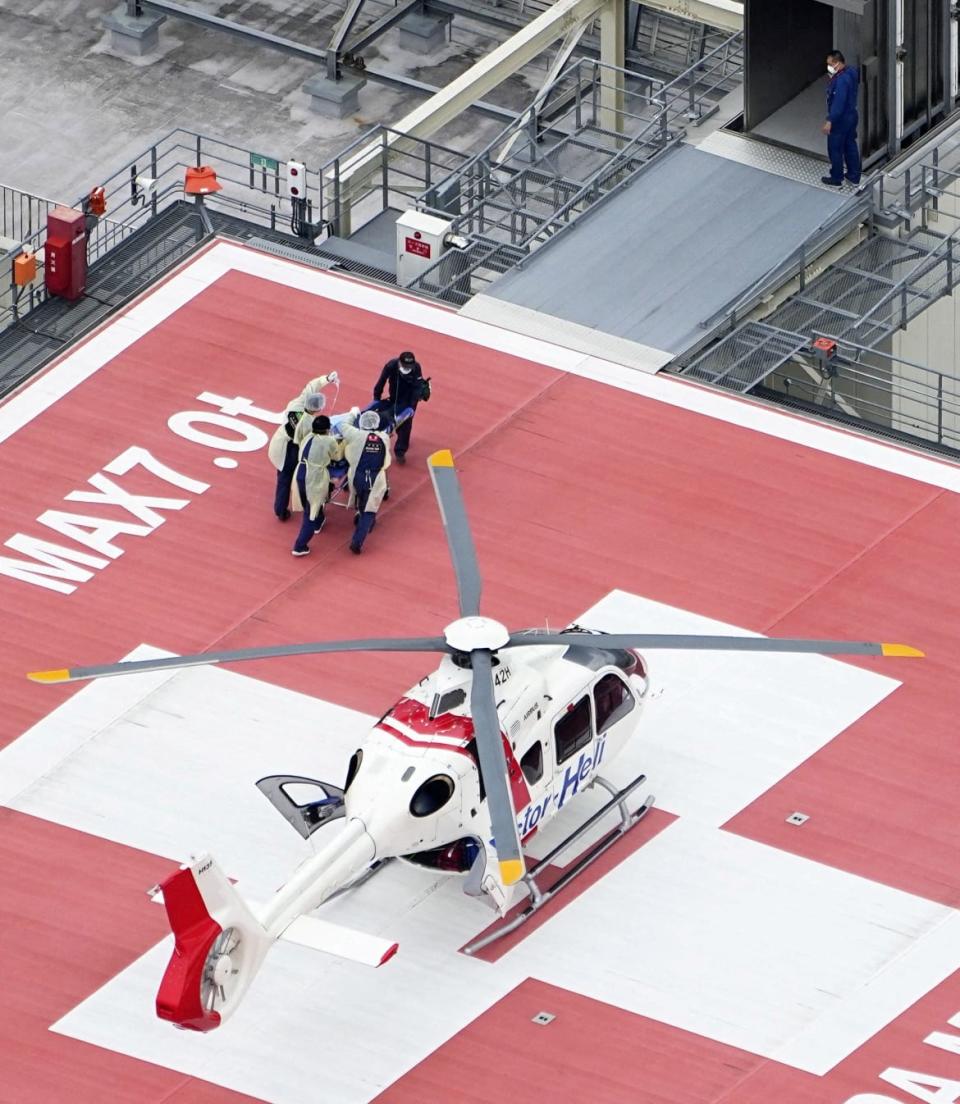
Shinzo Abe is carried on a stretcher as he arrives at a hospital in Kashihara.
Abe has been the target of one previous attack. In the summer of 2000, several firebombs were thrown at his office and home by the Kudo-Kai, a Yakuza gang. Real estate broker Saichi Koyama said he came up with the idea of asking the gang to carry out the attacks after a local aide of Abe’s refused to give Koyama cash in return for supporting a political ally of Abe in 1999.
The branch chief of the Kudo-Kai based in Kitakyushu ordered junior members to toss gasoline-powered bombs into Abe’s home and office. Koyama told The Daily Beast after his release from prison that Abe’s campaign manager had asked him to run a defamation campaign against an Abe political opponent in Yamaguchi prefecture but that Abe had never paid him. The firebombings were a response to being slighted, he asserted. It’s not known if Friday’s attack has any connection to the previous incident.
Since entering politics in 1993, Abe has been affiliated with the Liberal Democratic Party, a faction founded by his grandfather, Nobusuke Kishi, in 1955. Kishi, who was imprisoned and later released by the U.S. after World War II, served as Japan’s Prime Minister from 1957 to 1960.
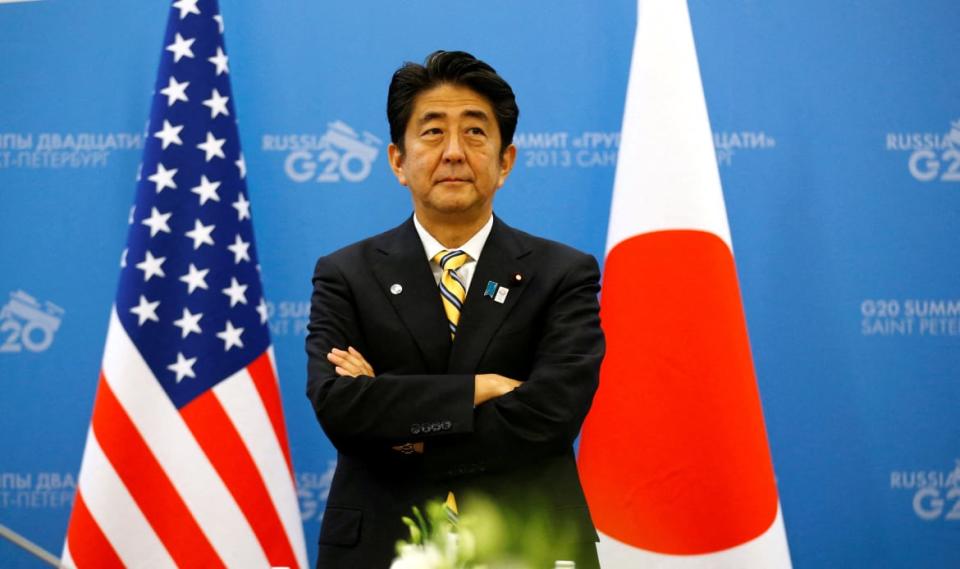
Shinzo Abe waits for then-President Barack Obama to arrive for their meeting at the G20 Summit in St. Petersburg in 2013.
Following in his grandfather’s footsteps, Abe became the youngest postwar politician to ever lead the country upon first taking office in 2006. He left office a year later due to chronic ulcerative colitis.
His health issues were again cited as the reason for a second resignation in 2020, by which point he had become Japan’s longest-serving prime minister. Critics said, however, that the popular leader had been losing fans amid his handling of the coronavirus pandemic.
Abe was criticized for being too slow to close Japan’s borders and implement social distancing rules at the start of the coronavirus outbreak, throwing the nation into a state of panic.
A politician with a conservative streak, he maintained a close relationship with former President Trump. “Absolutely devastating news that former Prime Minister Shinzo Abe of Japan, a truly great man and leader, has been shot,” Trump said in a statement. “He was a true friend of mine and, much more importantly, America. This is a tremendous blow to the wonderful people of Japan, who loved and admired him so much.”
Rahm Emanuel, the U.S. ambassador to Japan, said in a Friday statement. He offered prayers for “Abe-san, his family, & people of Japan.”
Get the Daily Beast's biggest scoops and scandals delivered right to your inbox. Sign up now.
Stay informed and gain unlimited access to the Daily Beast's unmatched reporting. Subscribe now.

